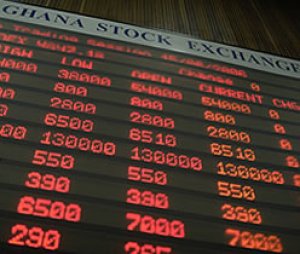The Ghana Stock Exchange (GSE) is encouraging dealers at banks to trade in corporate bonds to deepen liquidity on the Ghana Fixed Income Market (GFIM).
“We need to get the bank dealers who trade in government bonds to also endeavour to trade in corporate bonds so that we can get some liquidity in corporate bonds,” Ekow Afedzie, Deputy Managing Director of the GSE, said.
Speaking at the listing of the US$5million five-year bond as the first and second tranches of Ghana Home Loans’ (GHL) US$100million medium term note, Mr. Afedzie also urged other dealers and brokers to trade the bonds to enhance liquidity.
“We are hoping that IC Securities [GHL listing transactional advisors] will bring some liquidity to this particular bond on the market because we hardly have dealers trading the bonds on the market.
The bank dealers do not go near corporate bonds because…they call it credit risk but for the government ones they believe they are virtually risk free. So we need to get IC Securities to set the pace. If IC Securities can start making markets in the bonds of Ghana Home Loans then we will see some liquidity on this market,” he told brokers at the listing of the bond.
Since the establishment of the GFIM, the total value of bonds traded on the market has almost doubled to reach GH¢9.8billion as at September 2016, from GH¢5billion a year before. So far, GH374million has been raised in corporate bonds by six companies in finance, real estate, and commodities.
“It is possible to raise money through bonds on this market and this is as a result of the fact that we do have pension funds that have the appetite for debt instruments,” Mr. Afedzie, said. He explained that with the GFIM commencing operation for a year now, the market has seen a remarkable increase in the secondary trading of bonds, but liquidity challenges remain.
With more than 20 licensed dealers or brokers registered with the Securities and Exchange Commission (SEC), and about 15 primary dealers, the GSE is hoping that the primary dealers, mostly banks, will also be involved in secondary trading activities to boost trading on the bond market.
But Kofi Awuku, a member at the Treasury Department of Barclays Bank, noted that despite the excitement of the new developments, the market is only just beginning to develop and thus it will take some time before bank dealers begin to warm themselves up to these bonds.
“We barely had a corporate bond market, with only HFC issuing and listing corporate bonds. The market was quite shallow until recently, we are excited at the new issues coming up. Perhaps, it is only a matter of time before the banks begin developing their frameworks around participation in the corporate bond market,” he told the B&FT, in an e-mail.
He urged that far from suggesting that banks are shying away from the corporate bond market, the right focus should be on what the banks need to put in place, like mandates and operational guidelines, to be able to start trading corporate bonds.
“In the financial services, you need to take your time to work these things out before getting into a trading activity. These things are developmental and it takes time to build confidence and then put in the right infrastructure. It is new and early days yet and people need to warm up to these,” he added.
Mr. Awuku said that since banks have always traded sovereign bonds, with further developments in the corporate bond market develops, “we could see banks begin to get active in that market as well. We are excited at the new issues coming up.”
Business News of Thursday, 24 November 2016
Source: B&FT













